The experiences of Mr. Claude Echard, December 2006
Part I
It will have taken us more than three hours in the dust and chaotic traffic jams of Christmas Eve to get from Villa Salvador to Laderas de Chillon, north of Lima. There, too, we are entering a school and day-care center in a very difficult and dangerous neighborhood in the Lima suburbs.
Here it is the last day of school, and we are arriving in the middle of the children’s party. The association “Hatamy Warmi” (Arise, woman!), which runs the center, has brought together the parents (essentially the mothers) and their children for a double farewell party. Good-bye to the children who are leaving on vacation, and good-bye to the school building, because the school is supposed to move 800 meters further in the same neighborhood.
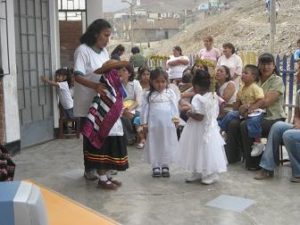
When we arrive, we are greeted by thunderous applause, and the president, Martha, interrupts the proceedings to introduce us and to thank us for the support that Terre des Hommes and the 1% Fund have provided for carrying out the current project: construction of a new school building on the other side of the neighborhood that will not only be larger but will also be the property of Hatamy Warmi.
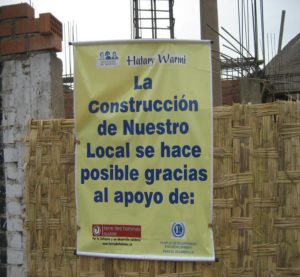
After an exchange of speeches, the party can continue. Dressed in resplendent costumes, probably sewn by their mothers in the workshop of the day-care center, the children are acting out scenes of the Christmas story – not as a missionary exercise but as a continuation of a tradition that dates back to the 16th Century – under the admiring gaze of their mothers.
Martha takes advantage of the occasion to give me a rapid tour of the premises: classrooms for children of different ages, lounges, etc. We pack into the 4×4 of Terre des Hommes and set off with several members of the governing committee of Hatamy Warmi for the construction site of the new school, renamed “Jesus educator of Chillon”. There, a large sign shows us the importance of the role of the 1% Fund in this project.
In spite of the unfinished look of the site, all the persons concerned are convinced that everything will be ready when classes recommence in March 2007. Even the pole of the electric power line planted squarely in the middle of a soon-to-be classroom is no problem, because there are only some administrative details to clean up, and they know that on January 8 the power company will let them know what day of the month they will be coming to move the power line off the school grounds.
Particular interest attaches to the fact that Hatamy Warmi is the owner of the building and the land: the objective of the project is to be able to serve more students and to do more (particularly to recruit a psychologist to offer help to those mothers who feel the need for the support). In the longer term, another parcel of land and another building are foreseen, in order to separate the teaching activities from those involving the mothers of the children.
I am offered some gifts and some drawings by the children for the 1% Fund, and after many expressions of thanks on both sides we set off for Lima, exhausted and dusty but generously compensated by the looks and smiles of these tenacious women who seem to have drawn strength from adversity.
Part II
It is about 11:00 in the morning when Félix Marin, Terre des Hommes coordinator for Peru, stops the car in front of the gate of the Maria Clotilde Association. We are in Villa Salvador, a disadvantaged and difficult neighbourhood in the southern suburbs of the national capital. Taxi drivers often refuse to go there, or triple the fare if they do. All of the dwellings are unfinished, the streets unpaved and the ground only sand. Buildings are often unstable because they lack sufficiently deep foundations. Four heads appear immediately, their faces split by wide smiles; they invite us to enter the court of the building. There we find:
- Gloria Buleje Miranda, President of the association;
- Tereza Tintaya Varagas, member of the Board of Directors;
- Hilda Navarro Chumpitaz, former President;
- Berta Navarro Chumpitaz, member of the association.
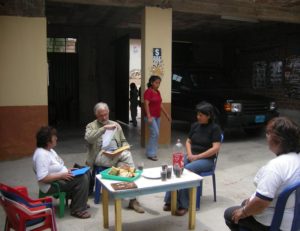
The Maria Clotilde Association is a nursery for children whose mothers are in difficult circumstances and who cannot take care of them after school. The first phase of construction of the building has been completed, and 49 children are being taken care of as a result. Soon, with the projected expansion of the second story, the women expect to have space of 90 or even 100. The total cost of the project is US$45,000 from Terre des Hommes and 1% for Development, with 1% responsible for the kitchen and toilets. In addition to caring for the children, the association also offers psychological help to the women of the neighbourhood who request it. They are in general women from the interior of the country, widows and single mothers. The neighbourhood is extremely violent. The young adolescents live in gangs; a boy from the house across the street was recently killed for having crossed the border into the territory of another gang. Hilda is still upset by the event: “it didn’t used to be like this, but now there are no limits to the violence!” she says, on the edge of tears. She points out that in Peru 46% of the adults suffer from malnutrition, 40% of the children lack dairy products and 38% of the population is unemployed.
For them, the help of the 1% for Development Fund was critical in their decision to enlarge the day-care facility, because the centre’s reputation is growing steadily and more and more of the mothers of the neighbourhood want to put their children there at the earliest possible age. Hilda gives me the final report for 1%, excusing herself for the delay and adding “we are still not very experienced with such things”. A financial statement is still missing, and she promises to get it to me before my departure from Peru in five days. [In fact, she will bring it to me the evening of the same day after an hour-and-a-half minibus ride with nothing to eat. She will arrive at my hotel at 10:00 at night, exhausted but happy to have put her papers in order!
Since the day before, the school year is over and the children are on vacation until March 2007. It is the most dangerous period for them, too. In spite of everything, some have been taken in hand by the association. I find them in the building next door. Delighted, they interrupt their drawing to give me spontaneous warm kisses. Following Peruvian tradition, we then share a Christmas panettone washed down with a sweet drink.
Gloria takes advantage of the moment to present their future plans: a new kitchen on the second floor. It turns out that the kitchen that was originally to be financed by 1% could not be built on the ground floor as planned because it had proved impossible to obtain the necessary permits, in spite of the architects plans. If that is the way it has to be, the kitchen will be built on the upper floor! [Editor’s note: It now has been! The Marias Clotildes have sent us a slide show with pictures of each step in construction. You can view it by clicking this link.]
Gloria also envisages a bakery. They need to train a specialist for that, but the space is already ready. This will complement the sewing studio that is already in operation. (They give me a T-shirt made on site by the mothers of the neighbourhood.)
We finally leave around 12:30. We get back into the car that Félix Marin had meanwhile parked in the court; on his last visit, he had left it in front of the gate and found it completely vandalized on his return. We leave behind some exceptional women of impressive lucidity and courage. Throughout our meeting, Hilda has not stopped thanking 1% for its vital help. It was definitely worth coming from so far away to hear it said!
Part III
Luis Solorio is waiting for me in front of the gate of this old house on Parra Avenue; quickly he takes me to see the facilities of Lluvia de Sol (“Shower of Sunshine”). It is late and the workshop is already closed. Two large rooms, tables piled with paper, various equipment. A courtyard where one can see a vat and a press. The equipment is not new, but it seems to meet the needs of the enterprise.
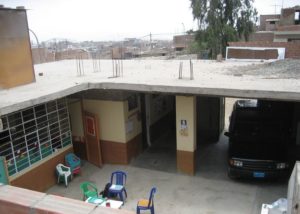
The adventure began in 1994. At that time, Luis wanted to undertake an original project: establish a cooperative and make paper from old newspapers and recycled cloth; but he did not have the necessary funds to invest in basic equipment. It was thanks to his contacts in Geneva that Luis succeeded in obtaining financing, first in 1998, and again in 2003. In both cases, it was the 1% Fund that he came to, because every source of credit was closed – no-one was interested in recycling, and commercial loans were prohibitively expensive. The government made a thousand promises, such as the free establishment of a mulberry plantation that would enable them to make paper under the conditions of sustainable development. But that project remained what it was from the outset . . . a promise. According to Luis, it was only thanks to the 1% Fund that they were able to take off and develop. “Without the 1% Fund, we would not have been able to purchase the machines that are necessary for this kind of activity.”
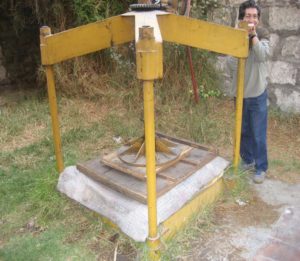
A large part of their production is made up of calendars, almanacs and other holiday gift items. Over time, Luis Solorio, Francy Cuenta and their collaborators have organized themselves well. We have arrived just before Christmas, yet there is no rush to get things finished, no feverish activity. The calendars were shipped months ago. This fact is, the cooperative works mainly with foreign partners, particularly in Geneva. Business these days seems to be as good as possible. (Even foreign residents of Peru have become faithful customers.) On the domestic market, not only is the competition fierce, but conditions are less favourable – payments for goods sold often arrive piecemeal and months late, which makes life hard for small enterprises like Lluvia de Sol that have very small budgets for the purchase of raw materials.
Five full-time employees, five workers with more flexible hours, equitable working conditions and unshakeable optimism – these seem to be the ingredients for the success of this small enterprise which is located 6000km from Geneva but could never have seen the light of day without the aid of Geneva’s 1% for Development Fund.
Future projects? They have them, such as entering a new recycling market: this time for linen, which seems particularly promising in artistic circles. For this, they need a new grinding machine adapted for linen fibers. A draft budget has already been established. Everything should go well.
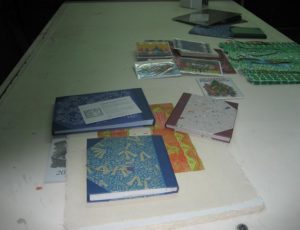
When I leave Luis Solorio and Francy Cuenta night has already fallen. The 1% Fund can sleep soundly – its project is in good hands.
